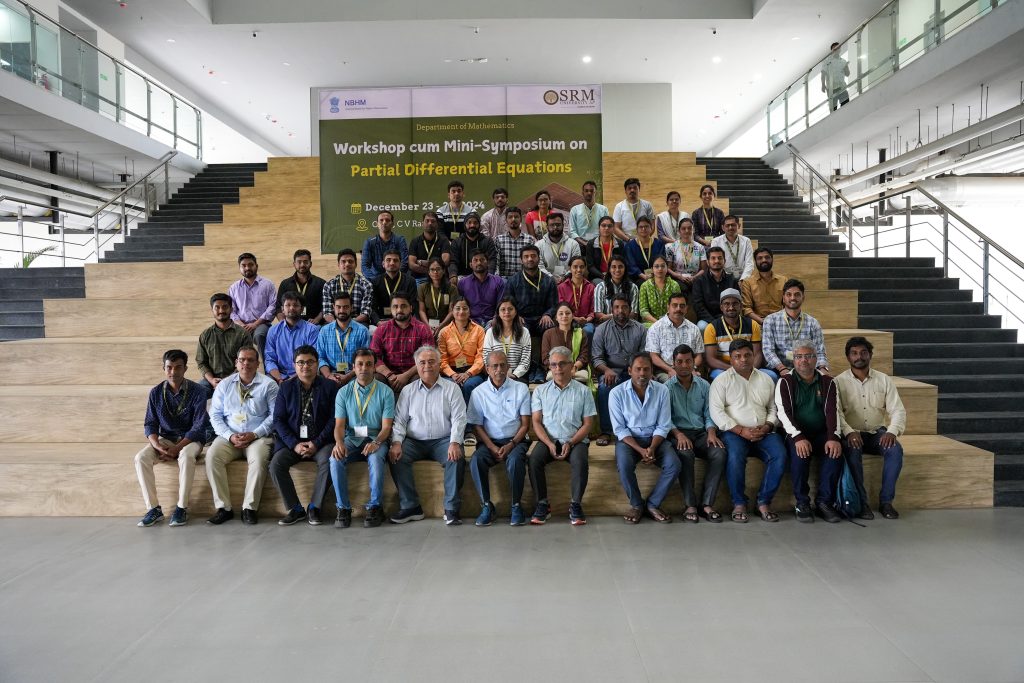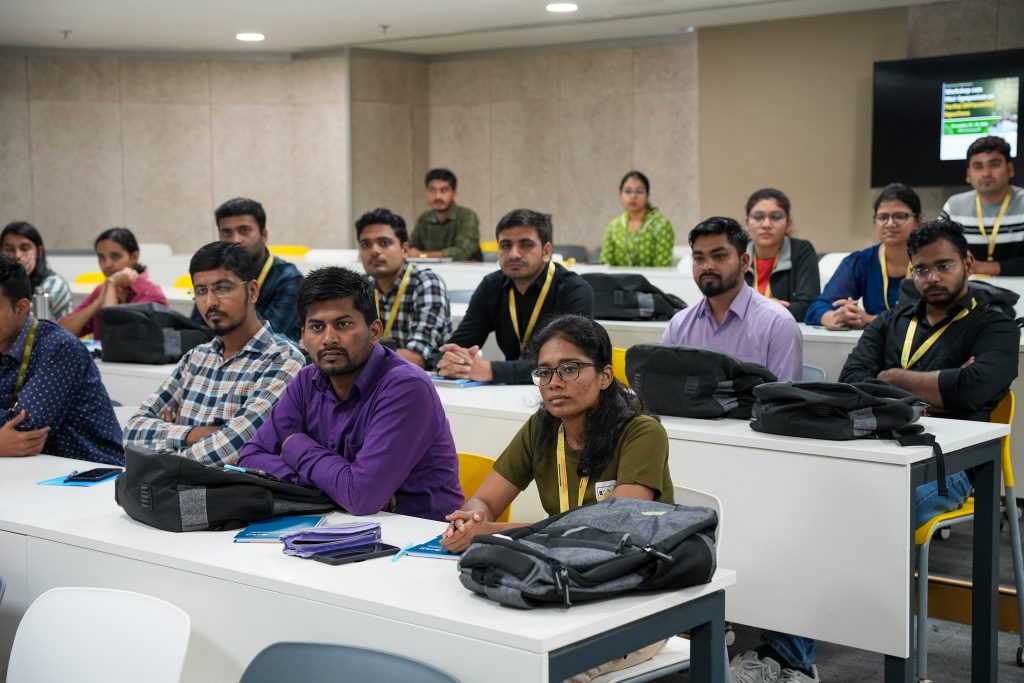Dr Kaur Explores New Frontiers in Mathematics
 Dr Surinder Kaur, Assistant Professor at the Department of Mathematics is making significant contributions to the mathematical community and SRMAP’s research wing, her research on understanding the group rings and addressing challenges such as the isomorphism problem for group algebra through her project has earned her a funding of ₹ 4.28 lakh from the prestigious National Board for Higher Mathematics (NBHM). Dr Kaur’s impressive research work has become a source of inspiration to many. Given below are some details on her project titled, “On the group rings, their unit groups and some related questions”
Dr Surinder Kaur, Assistant Professor at the Department of Mathematics is making significant contributions to the mathematical community and SRMAP’s research wing, her research on understanding the group rings and addressing challenges such as the isomorphism problem for group algebra through her project has earned her a funding of ₹ 4.28 lakh from the prestigious National Board for Higher Mathematics (NBHM). Dr Kaur’s impressive research work has become a source of inspiration to many. Given below are some details on her project titled, “On the group rings, their unit groups and some related questions”
A Brief Description of the Project
In this project, we aim at obtaining the structure and generators of the unit group of some group rings with a focus on answering the normal complement problem for them. Our further goal is to solve the celebrated isomorphism problem for group algebras of certain classes of groups, especially the twisted version of this problem for group algebras of nilpotency class at least 3. We also plan to look into certain questions in the representation theory of association schemes that are driven by what happens for group algebras.
Explanation of Research Objectives in layperson’s terms
In the last century, the work of E. Noether, F.G. Frobenius and R. Brauer have established that group rings play a central role in the development of representation theory. Further investigations indicated that these objects also have a great influence on the study of other areas of Mathematics like algebraic number theory, algebraic K-theory and algebraic topology. Moreover, the vital role it has played in the recent development of homological algebra and algebraic coding theory is worth acknowledgement.
- Published in Departmental News, Faculty Achievements, Math News, News
6-Day Workshop cum Mini-Symposium on PDE Successfully Concludes

The Department of Mathematics successfully hosted a 6-day Workshop cum Mini-Symposium on Partial Differential Equations (PDE) from December 23 to 28, 2024, with generous financial support from the National Board for Higher Mathematics (NBHM). The event aimed to bridge theoretical foundations and cutting-edge applications of PDEs, fostering academic dialogue among researchers, scholars, and students.
The Workshop held on the theme “Basics of regularity theory of elliptic partial differential equations” featured sessions by subject experts including Prof. A. Adimurthi, Visiting Faculty, Department of Mathematics and Statistics, IIT Kanpur; Dr Karthik Adimurthi, Reader, Tata Institute of Fundamental Research Centre for Applicable Mathematics, Bangalore and Prof. Prosenjit Roy, Professor, Department of Mathematics, IIT Kanpur.
Themed “Applied Mathematics Symposium on Differential Equations: Theory, Computation, and Beyond”, the mini-symposium featured insightful talks by Prof. Mohit Dalwadi, Associate Professor in Applied Mathematics, Mathematical Institute, University of Oxford; Dr Satyajit Pramanik, Assistant Professor, Department of Mathematics, IIT Guwahati and Dr Moitri Sen, Assistant Professor, Department of Mathematics, NIT Patna. These experts delivered lectures on advanced topics, including elliptic PDE theory, computational methods, and interdisciplinary applications.
The primary aim was to provide participants with a comprehensive understanding of the abstract theory of elliptic partial differential equations, emphasising both foundational principles and modern computational techniques. Interactive sessions, problem-solving workshops, and collaborative discussions enriched the learning experience.

The event witnessed enthusiastic participation from 23 outstation researchers (from reputed institutions across India) and PhD scholars from the Department of Mathematics, SRM AP. The diverse cohort facilitated vibrant academic exchanges and networking opportunities.
A special felicitation ceremony was also held on December 24, 2025, to honour Vigyan Shri Prof. Adimurthi for his monumental contributions to mathematics. This segment underscored SRM AP’s commitment to celebrating excellence in scientific research. The Workshop cum Mini-Symposium served as a dynamic platform for disseminating knowledge, fostering collaborations, and inspiring future research in PDEs.
- Published in Departmental News, Math News, News, Workshop
A Panel Discussion on Decoding the Budget 2025-26

The Department of Economics at Easwari School of Liberal Arts organised a panel discussion titled “Decoding the Budget: Insights, Perspectives, and the Big Picture” on February 03, 2025. The event was designed to provide in-depth insights into the Union Budget 2025-26, focusing on fiscal priorities, economic implications, and sectoral impacts. The discussion brought together distinguished experts from academia and policymaking to analyse key announcements and their long-term effects.
The panel discussion featured three esteemed panellists:
– Prof. Vinish Kathuria (Director, Institute of Development Studies, Jaipur & IIT Bombay) – Expertise: Productivity Measurement, Economics of Regulation, and Environmental Economics.
– Prof. D K Nauriyal (Professor, Department of Humanities and Social Sciences, IIT Roorkee) – Expertise: International Trade, Development Economics, and Economics of Intellectual Property.
– Dr Sujit Kumar (Chief Economist, National Bank for Financing Infrastructure and Development – NaBFID) – Expertise: Banking & Finance, Infrastructure, and the Indian Economy.
The experts analysed the macroeconomic factors influencing the budget, such as inflation control, fiscal deficit management, and global economic trends. The panellists discussed the implications of the budget on critical sectors, including infrastructure, banking, environmental sustainability, and trade policies. The discussion highlighted significant policy changes to boost economic growth and social welfare initiatives. The Q&A session allowed participants to seek clarifications and gain deeper insights into budget-related policies and their long-term effects.
Students, faculty, scholars, and individuals interested in economic policy and financial analysis participate in the discussion. Participants also joined online as the event was in the hybrid mode.
The panel discussion on Decoding the Budget 2025-26 successfully gave attendees a clearer understanding of India’s financial and economic direction. The expert insights helped bridge the gap between budgetary announcements and their practical implications. Students, faculty, and policymakers benefited from the interactive discourse, enhancing their knowledge of economic policies and fiscal governance.
This insightful session emphasised the importance of informed economic discussions in shaping perspectives on national financial policies and governance strategies.
- Published in Departmental News, Economics Current Happenings, Economics News, News
Enabling Research Excellence: Paari School of Business organises Five-Day FDP
 Research is essential for academics in today’s dynamic environment and SRMAP sincerely believes in the idea that research is the foundation to innovation and progress. The Department of Management at Paari School of Business organised a 5-day International Faculty Development Programme (FDP) in hybrid mode, focusing on the “Art of Writing High-Quality Research Articles in Management.” Resource persons, Prof. Piyush Sharma, Prof. Tak Yan Leung, Dr Kishore Gopalakrishna Pillai, and Dr Vimal Babu, provided participants with valuable insights into advanced research methodologies and effective academic writing strategies.
Research is essential for academics in today’s dynamic environment and SRMAP sincerely believes in the idea that research is the foundation to innovation and progress. The Department of Management at Paari School of Business organised a 5-day International Faculty Development Programme (FDP) in hybrid mode, focusing on the “Art of Writing High-Quality Research Articles in Management.” Resource persons, Prof. Piyush Sharma, Prof. Tak Yan Leung, Dr Kishore Gopalakrishna Pillai, and Dr Vimal Babu, provided participants with valuable insights into advanced research methodologies and effective academic writing strategies.
The FDP aimed to deliver a comprehensive understanding of the essential components of academic research and publication, equipping attendees with the skills required to craft well-structured, high-impact research articles. The topics discussed during the five-day programme were particularly relevant and contemporary. Moreover, the resource persons encouraged the participants to enhance their research output, improve the likelihood of the participant’s publication in reputable journals, and contribute meaningfully to the academic community. The FDP sought to bridge the gap between research conceptualisation and publication, enabling faculty members to become more proficient and impactful researchers.
Participants greatly benefitted from the combined expertise and experience of these distinguished scholars, fostering a deeper understanding of high-quality research practices.
- Published in Departmental News, News, Paari Current Happenings











